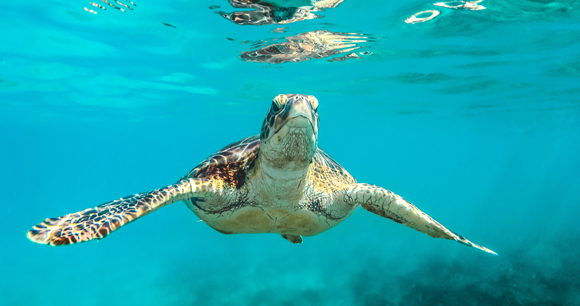
Be an Educated Consumer
Clearly it will take dedicated public effort to protect marine mammals and their habitat from the many threats they face. Stronger laws, more effective enforcement of existing laws, and international agreements that specifically include safeguards for marine mammals will all be necessary to ensure that this magnificent and diverse group of animals will continue to thrive in the vast oceans of the world.
Here are a few ways to help marine wildlife by being an educated consumer:
- As a consumer, you have the power to choose what you eat. If you do choose to eat seafood, please be aware of the different issues affecting your seafood choices. For example, overfishing; illegal fishing; the by-catch of marine mammals, seabirds, and sharks; as well as fishing industry connections to the whaling industry are all issues to consider when deciding whether or not to purchase seafood products. Please learn about environmentally friendlier choices and about what species to avoid because of sustainability or animal welfare issues associated with their capture and removal. If you have questions, please feel free to contact us.
- As a consumer you also have the power to choose brands and companies that implement sustainable policies, such as the airlines and hotel chains that have chosen not to ship nor serve shark fin products. Please click here for a compilation of companies that have said “no” to shark finning.
- Don’t release helium balloons—many species of marine wildlife can mistake them for food and ingest them, which can be fatal.
- Make careful tourism choices and do not participate in activities that exploit marine wildlife, including “swim with the dolphin” encounters and orca shows.
- Research whale and dolphin viewing operators before signing up and be sure they follow a code of conduct that minimizes or prevents harassment.
- Do not buy curios made of marine animals (such as dried-out sea stars or shark jawbones)
- Don't pour oil, engine fluids, cleaners, or household chemicals down storm drains or sinks.
- Find approved motor oil and household chemical recycling or disposal facilities near your home, and strongly encourage your family and friends to use them.
- Use environmentally friendly pesticides in your garden.
- Use other lawn, garden and farm chemicals sparingly, if at all.
- Before spreading chemicals or fertilizer, check the weather forecast for rain so they don't wash away.
- Repair automobile or boat engine leaks immediately.
- Take part in river and ocean clean-ups. If none exist near you, start a group!
- Cut up circular six-pack rings, plastic strapping and other debris likely to entangle wildlife.
- Reduce the amount of waste you produce and reuse or recycle items whenever possible!
- Chose reusable items over disposable ones.
Call, Write, and Email
Here are a few actions you can take to inform others about your concern for marine wildlife:
- Write to oceanariums and insist that they stop capturing marine mammals from the wild for display and commercial exploitation. Insist that they present accurate information on the natural history and behavior of these species so that people can make an educated, balanced comparison between the lives of wild and captive marine mammals.
- Keep up-to-date with what is happening in state and federal legislatures concerning the welfare and protection of marine mammals. When legislation that affects marine mammals is pending, write, call, or visit your legislators to express your concerns.
- Support local legislation that protects coastal habitats (e.g., laws that limit coastal development), regulates disruptive human activities (e.g., laws that set speed limits for boats in manatee habitat), prohibits keeping marine mammals in captivity, prohibits the removal of live marine mammals from state or local waters for display, or sets strict standards for the care and maintenance of captive marine mammals (e.g., laws that mandate very large tank sizes).
Check out our publications about marine wildlife, and share the publications with others. Sign up for action alerts from AWI to stay informed!